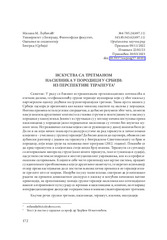Приказ основних података о документу
Iskustva sa tretmanom nasilnika u porodici: iz perspektive terapeuta
Experiences with domestic violence perpetrators in Serbia: from a practitioners’s viewpoint
| dc.creator | Ljubičić, Milana | |
| dc.date.accessioned | 2023-06-14T15:09:23Z | |
| dc.date.available | 2023-06-14T15:09:23Z | |
| dc.date.issued | 2023 | |
| dc.identifier.issn | 0085-6320 | |
| dc.identifier.uri | http://reff.f.bg.ac.rs/handle/123456789/4559 | |
| dc.description.abstract | У раду се бавимо истраживањем организационих потешкоћа и етичких дилема, те ефикасношћу групне терапије мушкараца који су због насиља у партнерском односу упућени на групнотерапијски третман. Таква врста захвата у Србији одскора је препозната као важан чинилац заштите од насиља у породици. Његова примена остала је ипак спорадична, а да бисмо разумели због чега, помогла нам је анализа друштвеног контекста и ставова стручне и опште јавности о насиљу у породици у нашој земљи. Јавност и стручњаци су у погледу начина поступања према насилницима у породици јасно опредељени: насилници су готово без изузетка мушког пола. Истраживачко питање којим смо се руководили у даљој анализи било је: Да ли и на који начин таква врста дискурса утиче на рад терапеута и личне помаке клијената – учесника у групној терапији? Да бисмо дошли до одговора, обавили смо дубински разговор с једним од терапеута у београдском Саветовалишту за брак и породицу, који води групе од оснивања овог програма (2012. године). Показаће се да пред терапеутом и клијентима стоји велик број изазова. Терапеути се суочавају са игнорисањем напора од струке (како колега терапеута, тако и тужилаца и судија), одсуством системске подршке и институционалног умрежавања, али и са професионалним сагоревањем. Клијенти себе често препознају као жртве система, предмет су идеолошког преобликовања које је друштвено наметнуто, те неретко испољавају отпор према настојањима да се постигне њихова лична промена и из терапије излазе пре него што се заврши. Имајући на уму такве исходе, сматрамо да је неопходно радити на промени доминантног дискурса о насиљу и могућим начинима његове превенције, на препознавању значаја групне терапије насилника као потенцијално важног алтернативног пута у раду са жртвама и насилницима и, коначно, на отварању интердисциплинарне дискусије о предностима и манама социотерапијског третмана. | sr |
| dc.description.abstract | This paper deals with research into organisational difficulty and ethical dilemmas, as well as the efficiency of group therapy of men who were sent to group therapy treatments due to intimate partner relationship violence. This type of intervention has recently been recognised in Serbia as an important factor in the protection against domestic violence. Nevertheless, its use has remained sporadic and in order to be able to understand reasons for this, we have found helpful an analysis of the social context, but also the views of experts and the general public regarding domestic violence in our country. The public and experts alike have a firm position in terms of treating domestic violence perpetrators: batterers are almost as a rule male. The research question as the focal point of further analysis was the following: Whether or in which way such a discourse affects the work of practitioners and personal development of the clients - participants in group therapy? To obtain the answer, we have conducted an in-depth interview with one of practitioners in the Belgrade Marriage and Family Counselling Centre, who has been in charge of this programme since it was first launched (2012). As it turns out, both the practitioners and the clients are faced with multiple challenges. The practitioners are faced with their efforts being ignored by experts (by fellow practitioners and prosecutors and judges alike), the absence of systemic support and institutional networking, as well as with professional burnout. The clients often see themselves as victims of the system; they are the subject of a socially imposed ideological reshaping and, therefore, not infrequently they demonstrate resistance to efforts aimed at achieving their personal change and so they leave the programme before it is actually completed. Bearing in mind such outcomes, we believe that it is necessary to work on a change of the prevalent discourse relative to violence and possible ways of preventing violence, on recognising the significance of group therapy of batterers as a potentially important alternative route in working with victims and perpetrators of domestic violence and, finally, on initiating an interdisciplinary discussion about the advantages and disadvantages of sociotherapy treatment. | sr |
| dc.language.iso | sr | sr |
| dc.language.iso | en | sr |
| dc.publisher | Srpsko sociološko društvo | sr |
| dc.rights | openAccess | sr |
| dc.rights.uri | https://creativecommons.org/licenses/by/4.0/ | |
| dc.source | Sociološki pregled | sr |
| dc.subject | групни третман | sr |
| dc.subject | насилници | sr |
| dc.subject | терапеут | sr |
| dc.subject | изазови | sr |
| dc.subject | евалуација | sr |
| dc.subject | group therapy | sr |
| dc.subject | perpetrators of domestic violence | sr |
| dc.subject | practitioner | sr |
| dc.subject | challenges | sr |
| dc.subject | evaluation | sr |
| dc.title | Iskustva sa tretmanom nasilnika u porodici: iz perspektive terapeuta | sr |
| dc.title | Experiences with domestic violence perpetrators in Serbia: from a practitioners’s viewpoint | sr |
| dc.type | article | sr |
| dc.rights.license | BY | sr |
| dc.citation.epage | 205 | |
| dc.citation.issue | 1 | |
| dc.citation.rank | M23~ | |
| dc.citation.spage | 172 | |
| dc.citation.volume | 57 | |
| dc.identifier.doi | 10.5937/socpreg57-40101 | |
| dc.identifier.fulltext | http://reff.f.bg.ac.rs/bitstream/id/11243/bitstream_11243.pdf | |
| dc.type.version | publishedVersion | sr |

